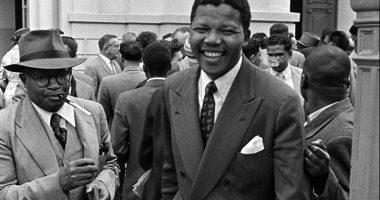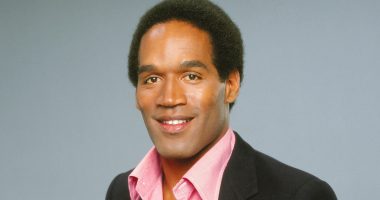When Lauren Groff decided to open a bookshop in Florida that would specialise in selling banned books, she got a message from fellow author and bookshop owner Ann Patchett in Tennessee: “You fool! I’m so proud of you.”
“It made me laugh and it made me wonder what I was getting into,” Groff says from her home in Gainesville, Florida. Is she foolish, then? “Yes, absolutely. We’ll see if we attract censure from the state. We’ll be subject to a fairly substantial pushback when we open. But we’re prepared for it. My managers are brave and brilliant women. And I have a very large microphone and can make a lot of noise.”
When her bookshop, Lynx, opens at the end of April, the first thing visitors will see will be a big wall painting of a lynx and the words “Watch us fight back”. Inside the doors they will see a huge display of banned books.
It’s not illegal for Groff to sell them. But it’s becoming harder and harder for young readers to access them in school libraries as pressure from the US state legal systems, politicians and religious and far-right campaigners forces librarians to remove them from the shelves. Public libraries are also affected, with reports of attempts to intimidate, harass or fire librarians, or to defund libraries.

Lauren Groff was so surprised when she learned that her novel had been banned that she didn’t take it seriously at first.Credit: New York Times
The scale is astonishing. According to a report by PEN America, an organisation that advocates for free expression, in the 2022-23 school year there were 3362 cases of books being banned, affecting 1557 titles. This was an increase of 33 per cent on the previous year; 33 states were affected and Florida was the worst. The bans limit the reading of some four million students, particularly those whose families can’t afford to buy books.
Banned titles range wildly, from literary classics to contemporary bestsellers, from the works of Gustave Flaubert, Toni Morrison and Margaret Atwood to those of Stephen King and Sarah J. Maas. Even Shakespeare was censored in one Florida district. A common theme is anything that discusses race, gender and sexuality.
Groff and Patchett, both guests of the Melbourne and Sydney writers festivals in May, are much acclaimed and admired authors of bestselling novels. Both have also had books banned. When Patchett discovered in January that her novels The Patron Saint of Liars and Bel Canto were banned, it took her just 45 seconds to start a video on Instagram. “Be careful,” she says, holding up the novels. “Don’t read these books.” The video had more than 19,000 likes in one day and has been seen by 1.5 million people.
Neither author has much idea why their books were targeted. Patchett points out that in The Patron Saint of Liars, which is about unwed mothers, the sex takes place before the story starts. Bel Canto is about terrorists and hostages, and in the end the terrorists get shot.
Groff was surprised when her novel Fates and Furies, a portrait of a marriage from both sides, was banned, and at first, she didn’t take it seriously. There’s sex in it, she agrees. But maybe one reason both had work banned was because former president Barack Obama put their books on his personal reading lists. Fates and Furies was his favourite book of 2015 and Patchett’s These Precious Days, along with Groff’s Matrix, made his list in 2021.
‘Kids are not going to be able to see themselves and understand who they are and that what they feel is normal. It’s so pernicious.’
Lauren Groff
One thing that alarms both women is that so much banning is set in motion by so few people. “It’s totally random,” says Patchett. “You can be looking on a bookshelf, think, ‘Oh, I don’t think that should be there’ and call up.” One person has been responsible for banning more than 200 titles just by calling, she says. Groff says most bans are led by two people, “imposing their will on millions”.
Why are school teachers and librarians so afraid of these callers? It’s often the threat of legal action. Groff says that in Florida, a law has been proposed that would make teachers vulnerable to criminal charges if they allow books with LGBTQ themes in classrooms. Governor Ron DeSantis’ House Bill 7, widely known as the “Stop WOKE Act”, limits discussions and education on race, diversity, equity and inclusion.
“There’s a law in Tennessee that if you go into a school library and you feel the book is inappropriate, you’re allowed to bring a civil lawsuit against the library or the teacher,” Patchett says. “Has that happened? I don’t think so. But it creates an atmosphere.”
Loading
The fear of being persecuted or prosecuted has meant many school teachers and librarians are taking books off their shelves even before they are challenged. And in some cases, one book ban may mean all that author’s titles are removed.
Groff worries that the bans are crucial to marginalised young people who don’t have access to books outside school. “Kids are not going to be able to see themselves and understand who they are and that what they feel is normal. It’s so pernicious, a sneaky shadowy thing that’s really disgusting.”
So she decided to set up Lynx with her husband, Clay Kallman, who comes from a family of booksellers. Hundreds of supporters sent in contributions via crowdfunding. “Lynx will be a lighthouse shining out to people who feel lost and left behind,” Groff says. “We’ll show them they are beloved, not hated, by the state of Florida.”
Patchett is already a veteran on the bookselling scene: her Nashville store, Parnassus Books, has been going for more than 12 years. Although she’s not involved in the day-to-day running of the store, she’s played an increasing role since her business partner, Karen Hayes, retired two years ago. “I’m in and out, I was there for three hours this morning,” she says. “I’m the face of the store, I talk to staff and customers.”
It’s about having a place where people are welcome, she says, even if all they do is sit and pat her dog, Sparky. “Everybody needs a third place to go, after home and work. To feel a warm reception and a community. It’s like going to a bar, except you’re not drinking.”
Reading has been “the great joy of my life”, she says. “Every year that goes by I become more and more of a reader and I want to share this joy with other people.”
Occasionally, she will feature a table of banned books or highlight certain banned titles. In the past few years she’s seen a huge rise in the popularity of romance and fantasy books (some of which have been banned).
Although the push to ban books comes overwhelmingly from the right of politics, Patchett is also concerned about cancel culture and shaming from the left. So often in both cases, she says, the objectors haven’t read the books.
An example is American Dirt, a bestselling novel about Mexican immigrants that was attacked because the author, Jeanine Cummins, was not Mexican (she has Irish and Puerto Rican heritage). “It became a story of a woman making a lot of money from a book, and a lot of people said, ‘I’d never read that book, it’s just terrible’. It’s not. It’s a very, very good book.”
Meanwhile, Australian book lovers can’t be too complacent. Gender Queer, a graphic novel-style memoir by non-binary writer Maia Kobabe, is one of the most frequently banned books in the US. Recently, conservative local activist Bernard Gaynor called for it to be restricted in Australia. The Classification Review Board rejected his request, but we may see more challenges.
Lauren Groff’s latest book is The Vaster Wilds (Cornerstone, $34.99). Ann Patchett’s latest book is Tom Lake (Bloomsbury, $32.99). The Melbourne Writers Festival runs from May 6-12: http://mwf.com.au. The Age is a festival partner. The Sydney Writers’ Festival runs from May 20-26, swf.org.au.
Read More: World News | Entertainment News | Celeb News
SMH










